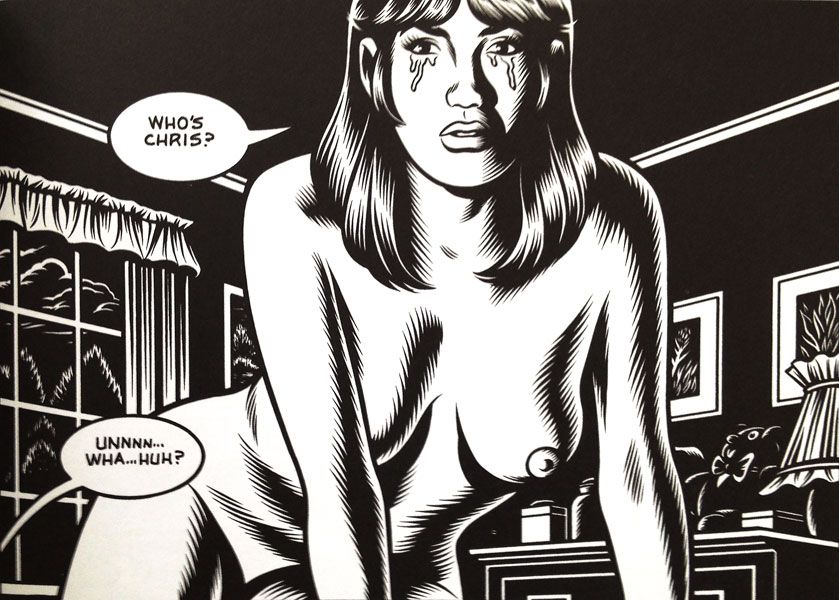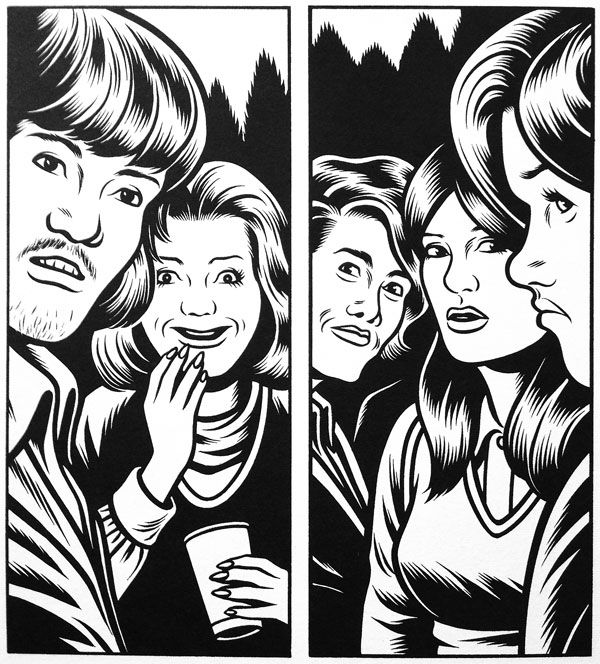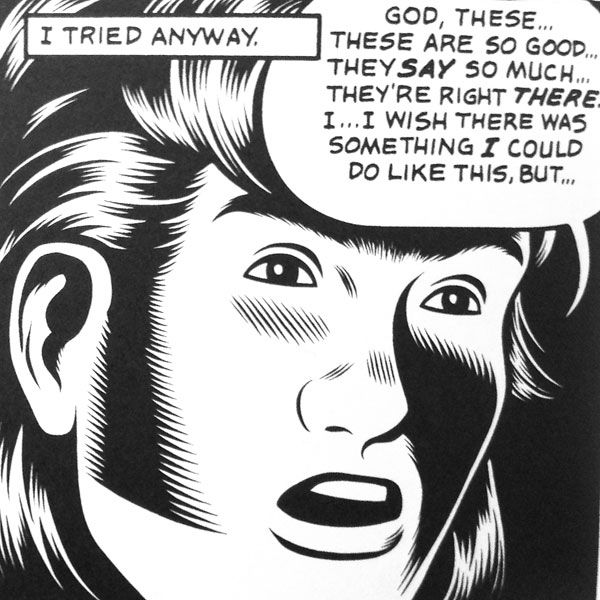Last night I picked up Charles Burn's Black Hole to read in bed. There are two reasons why this is a bad idea. First, the book is so good that there is absolutely no way that I could put it down without finishing it, so I was up half the night (and it is good enough so that I really can't rush it, even if I have already read it before.) Second, Black Hole is creepy, not in a generic horror movie way, where I get all twitchy and have to keep looking over my shoulder because I'm so on edge, but in an insidious, creep-into-my-subconscious-and-screw-with-my-dreams way. After I finished reading I lay awake for what felt like hours staring into the darkness and trying not to imagine that I could see anything in it. When I did finally fall asleep, I dreamt about impersonal dismemberment and important shaving rituals which lingered upon waking even though them made no sense. Waking up itself was a shock too, because my eyes were crossed, which has never happened. I couldn't get them to uncross, and eventually I succumbed to my body and surrendered to sleep for another half hour so that I could wake up in a slightly less physically confused state. It was impressive.
Beyond the strange experiences of last night, this is a book which has long been a lurking in the firmament of my life. When I first moved to there in 1996, San Francisco was in a transitional period. Not yet the hub of internet companies it would later become, rent was still cheap and so it was still home to all sorts of artists and strange, old shops, which very quickly changed the direction of my life. Pre-social media, there were so many things I'd never seen before, and one of the things I stumbled on upon was the first issue of Black Hole. A girl I met quite randomly ended up letting me stay in her insanely interesting apartment while she was away for a week, it was strewn with all manner of zines and foreign comic books that I'd never seen before and she gushed about Black Hole, even though it was only just beginning. Nowadays, if you pick up the nice fat book of Black Hole you may or may not notice that little note in the first couple of pages stating that it was originally published as a series of single issues between 1995-2005, but back then, trying to figure out where it was headed and what it all meant, those years just gave us more time to pore over each issue and try to read between those inky black brush strokes for Burns' hidden message. It took 10 years to finish. I just want you to think about that for a moment.
Reading Black Hole all at once in a nice, tidy bundle, it is impossible to experience what Black Hole was for all those years while it was slowly seeping out, issue by issue. The drawn out nature of it meant that every page, every panel, every line had to be treasured, examined and pored over, celebrated and loved in a vain attempt to divine the direction of the next issue. Because it took so long it felt like it became an integral part of life, like Christmas; it only happens once a year and even though I don't celebrate it, it is woven inextricably into the fabric of life. For years, the creepiest, weirdest, most unexpected, disturbing, heartbreakingly beautiful story was unfolding INCREDIBLY gradually. 10 years. Feel it. Imagine how much your life changed over those years. Then think about how intense Black Hole is and what that would feel like if it lasted for that long.
If you haven't read Black Hole, then you want to. We don't know each other, but if we were friends and spent time together, then at some point this book would have come up. It is a big, fat, classic tome of a comic book from a time before there were very many of those. If you've read my column before then you know I'm not a great synopsis writer, so instead I'll try to tell you how it feels to read it and maybe that will pique your interest. First, imagine that Caravaggio wasn't a pioneer of chiaroscuro painting in the 17th century, but was a movie director in the 1970s who filmed Freaks and Geeks while he was on LSD, in a dream you once had, which you then found a way to extract from your brain by very gently and agonizingly sliding a crochet hook up and back through the far reaches of your sinuses. It's something like that.
Black Hole is a quiet, dark, rich trip through vintage American high school, using every mutant, horror, outsider metaphor you can imagine, except this time they aren't metaphors at all. With all of that ink laid down so perfectly, the dialogue could be weak and it wouldn't matter. But of course it isn't, far from it, the book is insightful, touching, and authentic. Every reading reveals nuances and moments I'd missed before, new moments of simple truth so revealing and surprising that it shakes me. I remember things from my own life that I'd forgotten, those universal moments of hormonal fugue that is the teenage experience of friendship, drugs, love, sex, family, and life. It didn't make me miss it, although there were moment of intensity that made me feel like I could almost taste how it felt.
Reading each evocative, precious, disturbing panel is a journey that we agree to take with Burns. Through his sweeping, dedicated work we're taken back to a life we haven't lived in a place we don't want to be, and just for a while we can live there. It is all so entirely strange and unexpected, when it was coming out over the years, no one saw where it was heading or why, but the journey was so gradual and organic that it felt natural. Now, as a compilation you can read the entire story in a single night and it will hit you like deep, black tidal wave. In a hundred years, it will be recognized as one of the great American works of literature, it is visceral poetry, a true expression of the medium with imagery and words working together to create the most intimate impact. Black Hole is beautiful and terrible, it is a treasure.




